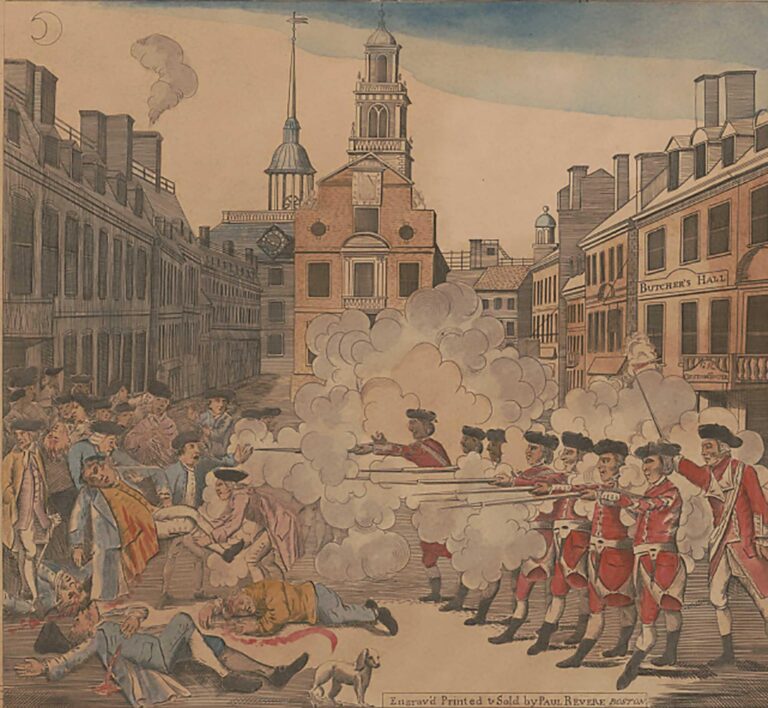On the evening of March 5, 1770, a deadly confrontation unfolded on King Street in Boston, marking a pivotal moment in colonial-American history. What began as a street brawl between American colonists and British soldiers quickly escalated into violence, resulting in the deaths of five civilians. Known as the Boston Massacre, this incident intensified already simmering tensions between the colonies and the British government, fueling widespread outrage and galvanizing opposition to British rule. Far from an isolated event, the massacre became a powerful symbol of colonial resistance, signaling a dramatic shift in public opinion and setting the stage for the revolutionary struggle ahead [[1]](https://www.history.com/articles/boston-massacre) [[2]](https://www.nps.gov/articles/000/boston-massacre.htm).
Table of Contents
- Boston Massacre Sparks Outrage Among Colonists
- Examining Eyewitness Accounts and Colonial Propaganda
- Legal Proceedings That Changed Public Opinion
- Strategies for Understanding the Event’s Lasting Impact
- Insights and Conclusions
Boston Massacre Sparks Outrage Among Colonists
The violent clash on March 5, 1770, between British soldiers and colonists in Boston ignited widespread fury that galvanized opposition to British rule. With five civilians dead and six injured, the incident was promptly branded a “massacre” by local leaders and propagandists seeking to expose what they described as oppressive occupation forces. News of the tragedy spread rapidly, fueling anti-British sentiment and unifying disparate colonial factions in their growing resistance. The arrest and imprisonment of Captain Thomas Preston and his eight soldiers further underscored the severity of the confrontation and highlighted colonial demands for justice.
Key factors intensifying colonial outrage included:
- The perception of British troops as an occupying force infringing on civil liberties.
- The aggressive and provocative behavior exhibited by both soldiers and townspeople in the months leading up to the incident.
- The colonists’ use of the event as powerful propaganda to rally public opinion against British policies and taxation without depiction.
This confrontation did not occur in isolation but was the culmination of escalating tensions that had beset Boston for months. The Boston Massacre became a pivotal moment, sharply defining the contentious relationship between the colonists and the British government, setting the stage for the revolutionary movement that would soon engulf the colonies.[1] [2]
Examining Eyewitness Accounts and Colonial Propaganda
The conflicting eyewitness testimonies from the night of the Boston Massacre reveal a complex and tense atmosphere. Some witnesses described the British soldiers as provoked but ultimately defensive, while others portrayed their actions as unprovoked aggression. These firsthand accounts became crucial in shaping public perception, as colonial leaders skillfully leveraged the varying narratives to fit their agenda. The murky details of that night were quickly distilled into clear-cut stories of British cruelty, often exaggerating the soldiers’ responses to heighten colonial outrage.
At the heart of the evolving narrative was colonial propaganda, which effectively molded public sentiment into a rallying cry for resistance. Pamphlets, engravings, and speeches painted the event as a deliberate massacre of innocent civilians, emphasizing:
- The innocence of the victims and the brutality of the soldiers
- The illegitimacy of British authority in the colonies
- The urgent need for unity among colonists to oppose oppression
This orchestrated campaign spread rapidly, turning a chaotic clash into a symbol of colonial grievance and galvanizing support for the cause of independence.
Legal Proceedings That Changed Public Opinion
The trial of the British soldiers involved in the incident captivated the colonial public, marking a pivotal moment in shifting attitudes toward British rule. Defended by future American patriot John Adams, the legal proceedings underscored the complexity of justice under occupation. Despite intense public pressure and widespread outrage, Adams secured acquittals for most soldiers by arguing they acted in self-defense amid a chaotic crowd. Yet, two soldiers were convicted of manslaughter, a verdict that both acknowledged colonial grievances and demonstrated the tenuous hold of British authority.
These courtroom events stirred colonial society in profound ways. The trial:
- galvanized community leaders and ordinary citizens to question the legitimacy of British military presence
- propelled revolutionary rhetoric by illustrating the potential abuse of power under imperial rule
- fueled propaganda efforts by colonial printers who disseminated dramatically biased accounts amplifying anti-British sentiment
Strategies for Understanding the Event’s Lasting Impact
To grasp the enduring meaning of the Boston Massacre, one must analyze its ripple effects on colonial unity and the escalating distrust toward British authorities. Contemporary accounts and propaganda campaigns exploited the tragedy to galvanize public opinion, transforming isolated outrage into a catalyst for revolution. Key strategies include examining primary sources-such as letters, newspaper editorials, and eyewitness testimonies-that reveal how the incident was framed to highlight perceived British oppression and colonial victimization.
Additionally, understanding how the Boston Massacre influenced legal and social frameworks offers valuable insights. Consider the event’s role in shaping:
- Colonial legal arguments challenging British parliamentary overreach
- Mass meetings and committees of correspondence that coordinated resistance
- Public rituals and commemorations reinforcing collective memory and identity
These elements collectively illustrate how a single violent encounter became a symbol fueling sustained anti-British sentiment that ultimately propelled the colonies toward independence.
Insights and Conclusions
The Boston Massacre remains a pivotal moment in American history, marking a sharp escalation in colonial resistance to British rule. This tragic clash not only fueled widespread outrage but also galvanized the movement that ultimately led to the American Revolution. As historians continue to explore its lasting impact, the event stands as a powerful reminder of the deep-rooted tensions and struggles that shaped the birth of the United States. Understanding this turning point helps illuminate the complex journey from protest to independence that defined the era.

